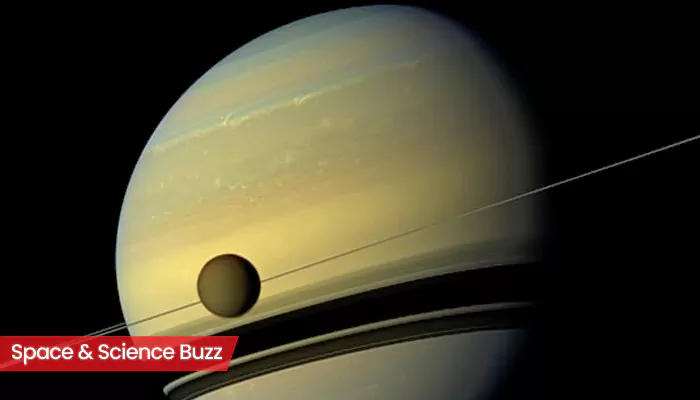
Here are today’s most important updates from the realm of Science and Space.
NASA revealed that cell-like compartments, known as vesicles, could form naturally in the lakes of Saturn's moon Titan. The lakes on Saturn's largest moon are filled with liquid hydrocarbons like ethane and methane. These vesicles are vital for the development of protocells, which are simple structures that can support chemical reactions. Titan's environment is different from Earth's as it has extremely low temperatures and a thick atmosphere, containing nitrogen and methane. Scientists believe that it could allow the formation of life forms that are distinct from those on Earth. If life can form in Titan's hydrocarbon lakes, it might be possible that life exists elsewhere in the universe under different environmental conditions. The upcoming Dragonfly rotorcraft, NASA's first mission to Titan, will focus on exploring the surface of the Saturnian moon, study the surface composition, make atmospheric and geophysical measurements, and also characterise its habitability.

According to a new research, diet plays a bigger role than physical inactivity when it comes to weight gain or obesity. The researchers pointed to the amount of ultra-processed food (UPF) in the diet. People in industrialised societies tend to eat more UPFs — like packaged snacks, sugary drinks, processed meats, and instant meals. These foods were strongly linked to higher body fat. The more UPFs in the diet, the more likely a person was to have a higher body fat percentage. The researchers believe that the way ultra-processed foods are made — their taste, texture, high calorie content, and appearance — can override natural hunger signals and lead to overeating. Processing also makes it easier for the body to absorb more calories, compared to unprocessed or whole foods. Currently, India ranks third in the highest number of overweight and obese individuals in the world.

There is evidence that plants and insects interact through sound, opening a new frontier in the study of acoustic communication in nature. The recently published study suggests that female moths detect ultrasonic distress signals emitted by dehydrated tomato plants and use this information to decide where to lay their eggs. Moths usually lay their eggs on tomato plants to provide food for their larvae after they hatch. The findings build on previous research by the group, which revealed that plants emit ultrasonic sounds when under stress. The discovery could have implications for agriculture and pest control, opening up possibilities for managing crop health and insect behaviour through sound.

A new study comparing three popular diets—intermittent fasting, time-restricted eating, and continuous calorie cutting—found that all can help people with type 2 diabetes lose weight and lower blood sugar. But one diet stood out: the 5:2 intermittent fasting plan, where participants eat normally five days a week and restrict calories on two. It led to better results in fasting blood sugar, insulin response, and sticking with the plan. The findings provide scientific evidence for clinicians to choose appropriate dietary strategies when treating such patients. Approximately 537 million adults worldwide, aged 20-79, are currently living with diabetes, with the vast majority (90-95%) having type 2 diabetes.